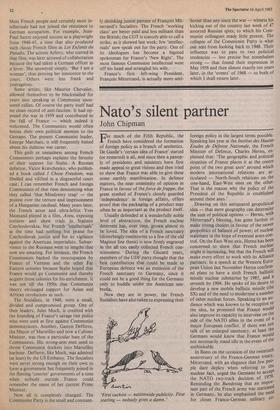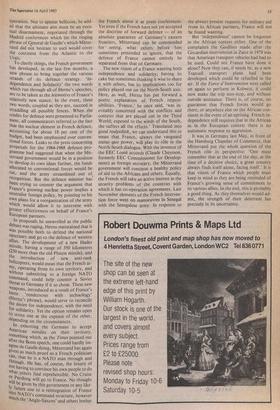Nato's silent partner
John Chipman
L'or much of the Fifth Republic, the
French have considered the formation of foreign policy as a branch of aesthetics. De Gaulle's 'certain idea of France' started (or restarted) it all, and since then a panop- ly of presidents and ministers have first made appeal to great visions and then tried to show that France was able to give these some earthly manifestation. In defence matters, the near unanimity of opinion in France in favour of the force de frappe, the great symbol of France's closely guarded 'independence' in foreign affairs, offers proof that the packaging of a product may often be as important as the product itself.
Usually defended at a wonderfully noble level of abstraction, the French nuclear deterrent has, over time, grown almost to be loved. The idea of a French sanctuary (disturbingly reminiscent to a few of the old Maginot line thesis) is now firmly engraved in the all too easily collected French con- sciousness. During the Giscard years, members of the UDF party thought that the best contribution that could be made to European defence was an extension of the French sanctuary to Germany, since it could not be a good thing for the Germans only to huddle under the American um- brella.
Now they are in power, the French Socialists have also taken to expressing their
'First cuckoo — nationwide publicity. First starling — nobody gives a damn.'
foreign policy in the largest terms possible. Speaking last year at the Institut des Hautes Etudes de Defense Nationale, the French Minister of Defence, Charles Hernu, ex- plained that: 'The geographic and political situation of France places it at the centre point of the two great axes' around which modern international relations are ar- ticulated — North-South relations on the one-hand, East-West ones on the other.- That is the reason why the policy of the President of the Republic is established around these axes.'
Drawing on this antiquated geopolitical idea — that mere geography can determine the sum of political options — Hernu, with Mitterrand's blessing, has gone further to make strong choices in favour of the newer geopolitics of balance of power; of nuclear stalemate in the hope of eventual arms con- trol. On the East-West axis, Hernu has been concerned to show that French nuclear might is increasing, but that the French win make every effort to work with its Alliance partners. In a speech at the Western Euro- pean Union last November Hernu confirm- ed plans to have a sixth French ballistic missile nuclear submarine by 1985, and a seventh by 1994. He spoke of his desire to develop a new mobile ballistic missile (the SX) and of the need to modernise a number of other nuclear forces. Speaking to an au- dience which was known to be receptive to the idea, he promised that France would also improve its capacity to intervene on the side of the NATO allies in the event of a major European conflict. If there was not talk of an enlarged sanctuary, at least the Germans would know that France would not necessarily stand idle in the event of the unthinkable. In Bonn on the occasion of the twentieth anniversary of the Franco-German treaty, Mitterrand, with an elegance that few peo- ple dare deploy when referring to the nuclear fact, urged the Germans to accePt the NATO two-track decision of 1979. Reminding the Bundestag that an impor- tam part of the French army was stationed in Germany, he also emphasised the need for closer Franco-German military co-
operation. Not to appear bellicose, he add- ed that the ultimate aim must be an even- tual disarmament, negotiated through the Madrid conferences which (in the ringing phrase of General de Gaulle's which Mitter- rand did n'ot hesitate to use) would cover the continent from the Atlantic to the Urals.
To clarify things, the French government has developed, in the last few months, a new phrase to bring together the various strands of its defence strategy. 'In- dependence and Solidarity' the two words Which run through all of Hernu's speeches, are to be taken as the leitmotivs of France's relatively new stance. In the event, these two words, coupled as they are, succeed in straddling all possible fences. When the credits for defence were presented to Parlia- ment, all commentators referred to the fact that the nuclear element in French defence, accounting for about 18 per cent of the budget, had been emphasised over conven- tional forces. Leaks to the press concerning proposals for the 1984-1988 defence pro- gramme had suggested that when the Mit- terrand government would be in a position to develop its own ideas further, the funds allocated to conventional forces would be cut, and the army streamlined out oft recognition. But the defence minister has been trying to counter the argument that France's growing nuclear power implies a neutralist foreign policy, by pointing to his ovvn plans for a reorganization of the army Which would allow it to intervene with , greater effectiveness on behalf of France's European partners. In proposals he unravelled as the public debate was raging, Hernu maintained that it was possible both to defend the national sanctuary and go to the defence of western allies. The development of a new Hades missile, having a range of 350 kilometres (230 more than the old Pluton missile), and the introduction of new anti-tank helicopters, would mean that the French ar- my, operating from its own territory, and Without submitting to a foreign NATO command, could help counter a Soviet threat to Germany if it so chose. These new weapons, introduced as a result of France's latest 'rendezvous with technology' (Hernu's phrase), would serve to reconcile the desire for independence, with the need for solidarity. Yet the option remains open to stress one at the expense of the other, depending on the circumstances. In .exhorting the Germans to accept American missiles on their territory, something which, as the Times pointed out after the Bonn speech, one could hardly im- agine de Gaulle doing, Mitterrand has again given as much proof as a French politician can, that he is a NATO man through and through. He has, of course, the luxury of not having to convince his own people to do what others find reprehensible. No Cruise or. Pershing will go to France. No thought will be given by this government or any like- !3, future one to a reintegration of France IMo NATO's command structure, however much the 'Anglo-Saxons' and others bother
the French about it at press conferences. Yet even if the French have not yet accepted the doctrine of forward defence — of an absolute guarantee of Germany's eastern frontiers, Mitterrand can be commended for seeing, what others before him sometimes pretended to ignore, that the defence of France cannot entirely be separated from that of Germany.
The new vision of a France wanting both independence and solidarity; having its cake but sometimes thinking it wise to share it with others, has its implications too for policy played out on the North-South axis. Here, as well, Hernu has put forward a poetic explanation of French respon- sibilities. 'France,' he once said, 'was in- evitably concerned with the conflicts and contests that are played out in the Third World; exposed to the winds of the South, she suffers all the effects.' Translated into good realpolitik, we can understand this to mean that France, always the vanguard status quo power, will play its role in the North-South dialogue. With the inventor of the EEC Lome accords (Claude Cheysson, formerly EEC Commissioner for Develop- ment) as foreign secretary, the Mitterrand government will continue a healthy policy of aid to the Africans and others. Equally, the French will take an active interest in the security problems of the countries with which it has co-operation agreements. Last November elements of the French interven- tion force went on manoeuvres in Senegal with the Senegalese army. In response to the always present requests for military aid from its African partners, France will not be found wanting.
But 'independence' cannot be forgotten in the African context either. One of the complaints the Gaullists made after the Giscardian intervention in Zaire in 1978 was that American transport vehicles had had to be used. Could not France have done it alone? Now they can, if needs be, as a new Transall transport plane had been developed which could be refuelled in the air. If the Force d'Intervention were called on again to perform in Kolwezi, if could now make the trip non-stop, and without outside assistance. There is, of course, no guarantee that French forces would go there, or anywhere else on the African con- tinent in the event of an uprising. French in- dependence still requires that in the African as in the European context there is no automatic response to aggression.
It was, in Germany last May, in front of the Hamburg Chamber of Commerce, that Mitterrand put the whole question of the French role in perspective: 'One must remember that at the end of the day, at the time of a decisive choice, a great country always finds itself alone, facing itself.' It is that vision of France which people must keep in mind as they are being reminded of France's growing sense of commitment to its various allies. In the end, this is probably a good thing. As they themselves would ad- mit, the strength of their deterrent lies precisely in its uncertainty.











































 Previous page
Previous page